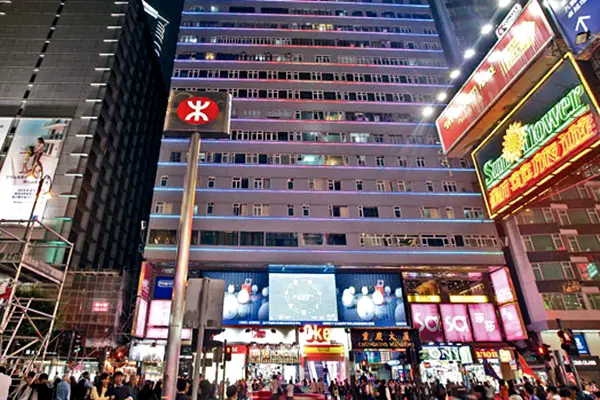QIAN Xingyu | City University of Hong Kong
Ethnicity and Business
By examining the complicated relationship between migrants from developing societies and their economic activities, Gordon Mathews has defined Chungking Mansions as a ghetto located within the golden mile in Tsim Sha Tsui. The “ghetto” refers that it is located in Hong Kong, but it does not belong to Hong Kong. Since in stereotype, this complex building is usually described as a world of darkness or a haven of crime in films or newspapers, and even local Hong Kong people refuse to step into it because their unfamiliarity and fears towards those ethnic groups from remote Africa or South Asia are usually associated with uncultured, poverty and violence, which has unintentionally created a segregation between Chungking Mansions and outside community.
Entrance of the Chungking Mansions at Nathan Road
Driven by economic benefits, profitable businesses in Chungking Mansions attract a variety of ethnic groups with different cultural background. The interactions based on economic activities have also intensified the relationship between ethnicity and intercultural integration. Seen from ethnographies’ perspectives, the main concern of global interactions is the tension between cultural homogenization and cultural heterogenization, but the heterogenization can be eased by posing global commoditization and capitalism (Arjun 1990: 295-296). Chungking Mansions is exactly such a place where interactions among different ethnic groups from different social classes can be supported by so-called “intensification of global interconnectedness by Mathew”. However, economic inequalities within these ethnic groups are evident: it is common for an Indian restaurateur or an African mobile merchant to hire an illegal employee from their mother land with very low salaries. But such inequalities can usually be tolerated within a relatively egalitarian community as the unified racial identity makes inequalities acceptable and achieves a divorce between ethnicity and economic incomes (Marshall and Bottomore 1987: 44-47). It is admitted that ethnicity is always less significant than business in Chungking Mansions because economic benefits go far beyond racialism. And even indeed, a Turk and an American would stop argue affairs about Middle East and respect each other with global citizenship.
Pakistani and Indian Restaurants in Chungking Mansions
Low-end Globalization and Neo-liberalism
Mathews does not define Chungking Mansions as an isolated community but one of the most globalized hubs closely connected with developing societies, such as Mainland China, South Asia, Middle East and Africa. By comparing the most advanced global business and high-end capitalism in Hong Kong Island, Mathew put forward this busily globalized building as “low-end globalization” referring “continuous transnational flow of population and cheap commodities involving small amounts of capital and informal or illegal transactions connected with developing societies.” Playing as a typical model of low-end globalization, Chungking Mansions aggregates mobile phone traders, clothing merchants, Indian restaurateurs, cheap hotelier, oversea tourists and sex workers. Stationed in Chungking Mansions, these individual merchants conduct their low-cost business and travel thousands miles to trade those cheap commodities in their poor developed hometowns day by day. Furthermore, Mathews gives three reasons to explain that why Chungking Mansions exist: 1) cheapness and low cost of business, 2) easiness to get visa to Hong Kong and transfer to other countries, 3) driven by manufactures of cheap goods in south China. In my view, these three interlocking principles are also actually the basic conditions for low-end globalization that highly relies on cheap goods and low expenditure because those needy people in poor society cannot afford expensive cell phones and clothes, while merchants from poor society have to maximize their profits by controlling costs. Moreover, Hong Kong provides relatively friendly visa policies for those who come from developing world and even many of them are allowed to stay for 14, 30 or 90 days without visas limits. Besides, due to very short distance to buy cheap goods produced in Guangdong, Chungking Mansions become an ideal transfer station for delivering goods to other developing countries.
Cellphone Shops
Notably, principles of neo-liberalism and competitive mechanism work efficiently in the market of Chunking Mansions. From a larger scale, Hong Kong is a market-driven economic entity requiring openness of global labor market and less immigration control. Under the background of neo-liberalism, businesses in Chungking Mansions also emphasize deregulation and less intervention to create a free market. This huge building just plays like a mini world with countless small shops such as restaurants, groceries, clothes, electronic appliances, hotels and private exchange counter, etc., and it seems that tenants have access to find everything they need including legal, illegal or semi-legal services. Counterfeit mobile phones produced in China, unlicensed restaurants and guesthouses, illegal labor as well as smuggling and prostitution are prevalent but tacit by Hong Kong authorities. In general, most of businesses are operated in normal manners, but it is difficult or even impossible to profitably run a business in Chungking Mansions following the law or official ordinance as a whole. Due to the cheapness and low cost are the most significance of low-end globalization, it is essential for merchants to control any extra expenses and try their best to bypass official regulations. Mathews identifies that it is such semi-legal activities that let Chungking Mansions possibly become a hub of low-end globalization.
(APD)
Reference
Arjun, A. 1990. Disjuncture and difference in the global cultural economy. Theory, Culture and Society, 7, 295-310.
Mathews, G. 2011. Ghetto at the Center of the World: Chungking Mansions. Chicago: University of Chicago Press.
Marshall, T. H and Bottomor, B. 1987. Citizenship and Social Class, 44-47. London: Pluto Press.
Author:
Qian Xingyu, postgraduate student at department of public policy of City University of Hong Kong, interested in research urban issues and like wandering streets and lanes to find something fascinatingin Hong Kong.
 简体中文
简体中文

